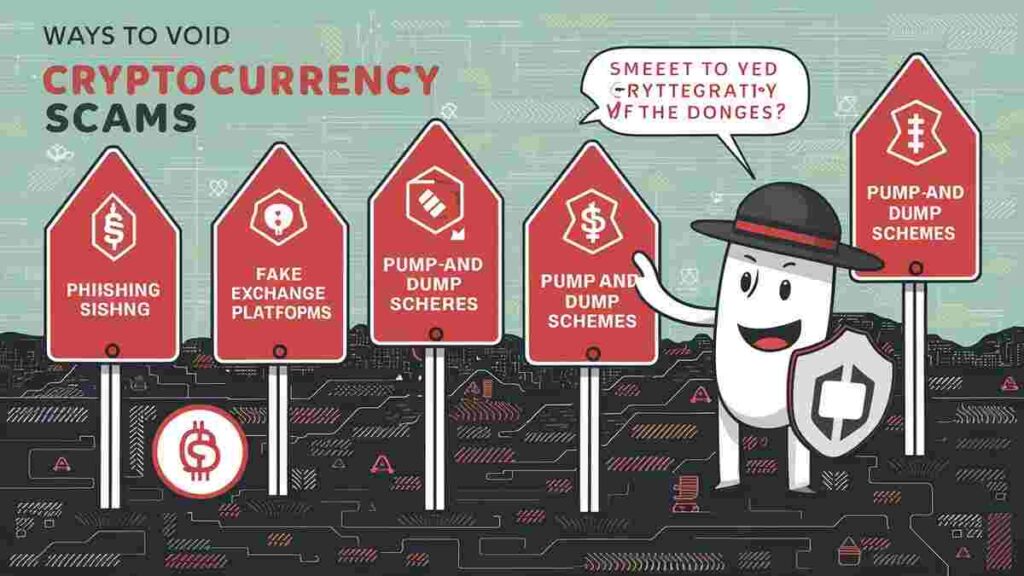
Cryptocurrency Scams to Avoid has become a significant player in the financial world, offering unprecedented opportunities for investment and wealth generation. However, as the popularity of digital currencies grows, so does the number of scams designed to exploit unsuspecting investors. This comprehensive article outlines the top cryptocurrency scams to avoid, ensuring that you stay informed and protected in the volatile crypto market.
1. Ponzi Schemes
Ponzi schemes are among the most common cryptocurrency scams. These fraudulent schemes promise high returns with little risk to investors. Cryptocurrency Scams to Avoid Early investors are paid profits from new investors’ funds rather than from profits earned by the operation of a legitimate business.
Cryptocurrency Scams to Avoid How Ponzi Schemes Work
- Recruitment: Scammers attract investors by promising high returns with minimal risk.
- Payments: Initial returns are paid out to early investors from the funds of newer investors.
- Collapse: The scheme collapses when the scammer can no longer recruit, Cryptocurrency Scams Avoid enough new investors to pay returns to earlier investors.
- Unrealistic Returns: Promises of guaranteed, high returns with little or no risk.
- Lack of Transparency: Limited or no information about the company or its operations.
- Pressure to Reinvest: Encouragement to reinvest earnings rather than withdraw them.
2. Cryptocurrency Scams to Avoid Phishing Scams
Phishing scams are deceptive attempts to obtain sensitive information such as usernames, passwords, and private keys by pretending to be a trustworthy entity.

Cryptocurrency Scams to Avoid How Phishing Scams Work

- Fake Emails and Websites: Scammers send emails or create websites that look legitimate to trick individuals into entering their private information.
- Malware: Some phishing scams involve malware that infects the victim’s device to steal sensitive information directly.
- Cryptocurrency Scams to Avoid Unsolicited Communication: Unexpected emails or messages asking for personal information.
- Suspicious Links: URLs that are slightly misspelled or have unusual domain names.
- Urgent Language: Messages that create a sense of urgency to act quickly.
3. Fake ICOs (Initial Coin Offerings)
Initial Coin Offerings (ICOs) are a popular method for cryptocurrency startups to raise capital. However, fake ICOs are scams designed to steal investors’ money.
Cryptocurrency Scams to Avoid Fake ICOs follow these steps:
- Creation: Scammers create a fake cryptocurrency and offer it to investors as part of an ICO.
- Promotion: The fake ICO is heavily promoted through social media and other channels.
- Disappearance: After collecting funds from investors, the scammers disappear, leaving investors with worthless tokens.
Cryptocurrency Scams to Avoid Identifying Fake ICOs
- Lack of Whitepaper: A legitimate ICO will have a detailed whitepaper outlining the project.
- No Verifiable Team: Absence of information about the development team or fake team members.
- Too Good to Be True: Unrealistic promises about the project’s potential and returns.
4. Pump and Dump Schemes

Pump and dump schemes involve artificially inflating the price of a cryptocurrency to attract investors, only for the price to crash once the scammers sell off their holdings.

Mechanics of Pump and Dump Schemes
- Pump: Scammers buy large amounts of low-value cryptocurrency and hype it up to attract more buyers.
- Dump: Once the price rises due to increased demand, scammers sell their holdings at the inflated price.
- Cryptocurrency Scams to Avoid Crash: The price plummets, leaving other investors with significant losses.
Warning Signs of Pump and Dump Schemes
- Sudden Price Increases: Rapid and unexplained increases in the price of a cryptocurrency.
- Hype Without Substance: Extensive promotion without any substantial news or developments.
- Small Market Cap: Targeting cryptocurrencies with low market capitalization.
5. Fake Cryptocurrency Exchanges
Fake exchanges are fraudulent platforms that trick users into depositing their funds, only to steal them.
Cryptocurrency Scams to Avoid Operation of Fake Exchanges
- Creating Realistic Websites: Scammers create websites that look like legitimate cryptocurrency exchanges.
- Offering Attractive Rates: These exchanges often offer better rates or lower fees to attract users.
- Stealing Funds: Once users deposit funds, the scammers disappear, taking the funds with them.
Avoiding Fake Exchanges
- Check Reputation: Use well-known and established exchanges.
- Verify Security: Ensure the exchange has robust security measures in place.
- Look for Regulation: Prefer exchanges that are regulated by relevant authorities.
6. Cloud Mining Scams
Cloud mining scams involve companies that claim to offer mining services for a fee but do not actually perform any mining.
How Cloud Mining Scams Function

- Sales Pitch: Scammers sell mining contracts promising high returns.
- No Real Mining: The company does not actually own any mining hardware.
- Cryptocurrency Scams to Avoid Vanishing Act: Scammers disappear with the investors’ money.
Identifying Cloud Mining Scams
- Lack of Transparency: No information about the mining equipment or location.
- Guaranteed Profits: Promises of fixed returns, regardless of market conditions.
- No Physical Presence: Companies without a physical address or verifiable identity.
7. Social Media Scams
Social media platforms have become a hotbed for cryptocurrency scams, leveraging their broad reach to target individuals.
Types of Social Media Scams
- Fake Giveaways: Scammers impersonate celebrities or companies, promising to multiply any cryptocurrency sent to them.
- Cryptocurrency Scams to Avoid Impersonation: Scammers create fake profiles to trick users into sending them cryptocurrency.
- Fraudulent Promotions: Paid promotions of fake projects or coins.
Preventing Social Media Scams
- Verify Accounts: Check if the social media account is verified.
- Be Skeptical of Giveaways: If it sounds too good to be true, it probably is.
- Report Suspicious Activity: Report and block suspicious accounts immediately.
8. Malware Attacks
Malware attacks involve malicious software designed to steal cryptocurrency from your wallets.
Types of Malware
- Keyloggers: Record keystrokes to capture passwords and private keys.
- Clipboard Hijackers: Alter clipboard data to change the wallet address during transactions.
- Cryptocurrency Scams to Avoid Ransomware: Encrypts files and demands cryptocurrency for decryption.
- Protecting Against MalwareAvoid Suspicious Links: Do not click on unknown or suspicious links.
- Regular Backups: Back up your wallet and other important data regularly.
Conclusion
As cryptocurrency continues to gain traction, so do the number and sophistication of scams. By staying informed and vigilant, you can protect your investments from these common cryptocurrency scams. Always conduct thorough research, verify sources, and exercise caution when dealing with digital currencies.
Read More: The Power of Reliable Technology





